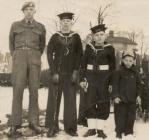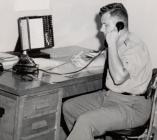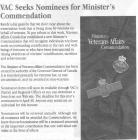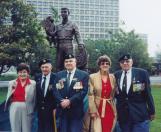1
Doug Whorrall- Korean War Veteran---First DraftInterviewed on November 26, 2003
Doug Whorrall is a Korean War Veteran originally from the East Coast, who settled in the Innisfail community upon retiring from the military. He was from Halifax, and was born in Hantsport, Nova Scotia on September 23, 1931 to a family of sea captains. Despite this family history, Doug had an uncle who had been an original sapper in R.C. Engineers whom he respected more than any other member of his family. Doug never really had any interest in working by the ocean. During the Second World War in Nova Scotia, it was mandatory for all male children of a certain age to join cadets, so Doug began his military training at the young age of eleven. Doug distinctly remembers the Reviewing Officer inspecting his group of cadets and telling the young boys that it was "real pleasant to inspect [them] because [they were] the future generation," which made quite an impact on the twelve-year-old Doug. For five years, Doug trained with the army cadets; he then served with the air cadets for one year, and spent one year in the reserve army before going active mere days before his eighteenth birthday, on September 9, 1949.
3
He joined the military with two friends; one chum of his from school, Charles Webb, joined the Artillery at the same time. Unfortunately, Charlie was killed in Korea. When Doug went active, he was considered to be a trained soldier: cadets received six months credit for training upon being recruited. He spent another eighteen months training in the Signal Corp at Kingston, Ontario, where he met his future wife whose father was stationed there, before being considered fully qualified. He was trained as a field switch board operator, and was instructed in teletype, crypto, radio, and all communications. Doug married on March 12, 1951 and almost immediately after (March 17, 1951) left for Fort Lewis, Washington for special training with the 25th Brigade commanded by Brigadier General Rockingham and thus became one of "Rocky's Boys." In May of 1952, Doug was attached to an Australian unit, with whom he remained for six months starting on May 24, 1952. He worked alongside the Aussies on the Singapore Circuit. Doug has a humourous anecdote about the time he spent in Korea:The highest precedence for a message was "flash". When Bert Claxton, Canadian Minister of National Defence at the time, was visiting the 25th Brigade, he sent a "Five Bells Flash" back to Canada. The reason for the alarm? The officers at the front line didn't have sun glasses.
The Korean War consisted mostly of trench warfare, similar to that of the First World War. The war caused a lot of what is now known as post traumatic stress syndrome, which was referred to as shell shock when it was first observed in soldiers. Doug still has nightmares about returning to the War; he also has a ringing in his ears, though that was caused by his life-long occupation in communications, located next to the tarmac at the air force bases were he was employed. With planes at such a close proximity a large portion of the time, his hearing was permanently damaged.
9
Doug Whorrall and his wife Joyce, both far right, in front of the memorial statue in Ottawa commemorating those who fought and lost their lives in the Korean War.10
A photo from the paper showing Whorrall receiving a memorial candle from local students.November, 2003
Innisfail, Alberta
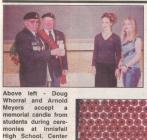
11
Upon returning home from the Korean War, little had changed with regards to society's awareness of what was happening in Korea; no one knew where Korea was, and there was no fan fare like there was for the World War veterans. The Korean war was still considered a police action, and public support was hard to come by.Doug's three year tour of duty ended on September 9, 1952; he promptly transferred to the Air Force, where he remained until 1979 when he retired. He then joined the community Reserves in Red Deer for two years before complete release, and then joined the Ready Reserves where he served as a Sergeant Major until he was 65. After retiring from the military, Doug settled in Innisfail and worked at the hospital there for five and a half years.
Currently, Doug has dedicated himself to helping fellow veterans and has fought to have certain disabilities recognized. Since retiring, Doug has helped over 400 veterans receive disability pensions. He began helping his fellow veterans when his neighbour, a veteran himself, had difficulty securing a disability pension despite his faulty knees. Doug aided him in getting his pension, and then moved on to help other Korean war veterans in the area. Most veterans have difficulty typing, so Doug produces documents for them and helps them with the paperwork required in applying for a pension. Doug has committed himself to raising the profile of Korean veterans in Central Alberta, seeing to it that the Korean War was added to various cenotaphs around the province. He also aids widows of World War Two and Korean veterans in getting help with lawns, grounds, and housekeeping. Doug is a great contributor to the local paper, submitting articles pertaining to the veterans on regular occasion. Doug was also present on September 28, 2003 when 1200 Korean veterans marched into Ottawa for a ceremony regarding a replica of the statue in Busan, Korea commemorating the 518 people killed in the War.
